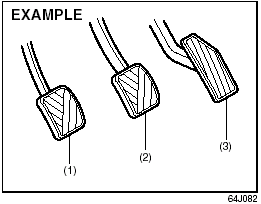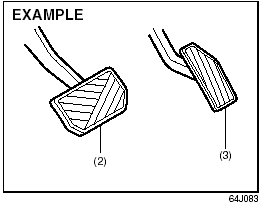Pedals

Manual transmission

Automatic transmission
Clutch Pedal (1)
(For manual transmission).
The clutch pedal is used to disengage the drive to the wheels when starting the engine, stopping or shifting the gearshift lever or transfer lever. Depressing the pedal disengages the clutch.
CAUTION:
Do not drive with your foot resting on
the clutch pedal. It could result in
excessive clutch wear or clutch damage.
Brake Pedal (2)
Your SUZUKI vehicle is equipped with front disc brakes and rear drum brakes.
Depressing the brake pedal applies both sets of brakes.
You may hear occasional brake squeal when you apply the brakes. This is a normal condition caused by environmental factors such as cold, wet, snow, etc.
 WARNING:
WARNING:
If brake squeal is excessive and
occurs each time the brakes are
applied, you should have the brakes
checked by your SUZUKI dealer.
 WARNING:
WARNING:
Do not “ride” the brakes by applying
them continuously or resting your
foot on the pedal. This will result in
overheating of the brakes which
could cause unpredictable braking
action, longer stopping distances or
permanent brake damage.
Accelerator Pedal (3)
This pedal controls the speed of the engine. Depressing the accelerator pedal increases power output and speed.
See also:
Highway Driving
When driving at highway speeds, pay
attention to the following:
• Stopping distance progressively
increases with vehicle speed. Apply the
brakes far enough ahead of the stopping
point to allow ...
Using the Transfer Switch (if equipped)
Using the Transfer Switch (if equipped)
Your vehicle is equipped with a four-mode
full-time 4x4 system. You can use the
transfer switch to select any of the four
modes: N, 4H, 4H LOCK, 4L LOCK.
...
Clutch Pedal
Clutch Pedal
Check the clutch pedal for smooth operation
and clutch fluid level from time to time.
If clutch dragging is felt with the pedal fully
depressed, have the clutch inspected by
your S ...
